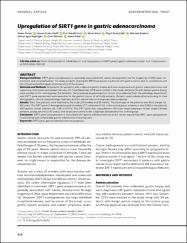Upregulation of SIRT1 gene in gastric adenocarcinoma

Göster/
Tarih
2019Yazar
Özcan, ÖnderBelli, Ahmet Korkut
Çetin, Esin Sakallı
Kara, Murat
Çelik, Özgur İlhan
Kaplan, Mehmet
Polat, Murat
Üst veri
Tüm öğe kaydını gösterÖzet
Background/Aims: SIRT1 gene overexpression is reportedly associated with cancer development, via the triggering of DNA repair impairment, and cell proliferation. The study aimed to investigate SIRT1 expression in patients with gastric cancer and its correlations with the clinical and pathological characteristics of the disease. Materials and Methods: All patients (64 patients) who underwent gastric biopsy and were diagnosed with gastric adenocarcinoma and signet ring cell carcinoma between January 2011 and December 2013 were enrolled in the study, and patients with benign gastric biopsy were enrolled in the control group (34 patients). The previously prepared gastric tissues were collected from the pathology department, and SIRT1 gene expressions were evaluated in the gastric tissues of all study patients. Patients were subclassified according to their demographic, clinical, and pathologic features, and the patient and control groups were compared. Results: Sixty-four patients were included in the study (25 females and 39 males). The mean age of the patients was 66 +/- 1 (range: 3388) years. The SIRT1 gene 2' Average delta cycle threshold (CT) value was 0.102 in the control group, whereas it was 0.292 in the patients with gastric cancer (relative risk: 2.86; p=0.014). The SIRT1 gene was upregulated in all tumor stage subgroups except stage I, female patients, young patients (<= 45 years), and corpus and cardia tumor subgroups compared to the control group. Conclusion: SIRT1 gene overexpression is associated with gastric adenocarcinoma, and it can be argued that SIRT1 gene upregulation is associated with unfavorable gastric adenocarcinoma prognosis.

















